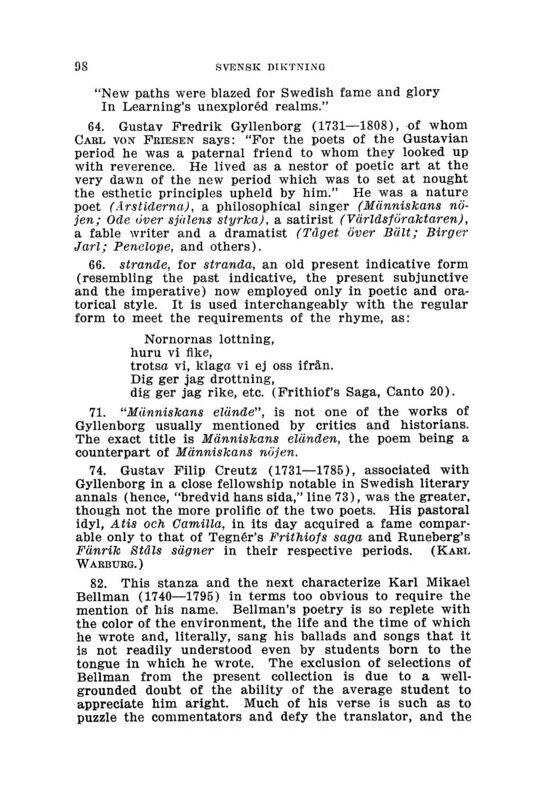
Full resolution (JPEG) - On this page / på denna sida - Sidor ...

<< prev. page << föreg. sida << >> nästa sida >> next page >>
Below is the raw OCR text
from the above scanned image.
Do you see an error? Proofread the page now!
Här nedan syns maskintolkade texten från faksimilbilden ovan.
Ser du något fel? Korrekturläs sidan nu!
This page has never been proofread. / Denna sida har aldrig korrekturlästs.
98 SVENSK DIKTNING
"New paths were blazed for Swedish fame and glory
In Learning’s unexploréd realms.”
64. Gustav Fredrik Gyllenborg (1731—1808), of whom
CARL VON FRIESEN says: "For the poets of the Gustavian
period he was a paternal friend to whom they looked up
with reverence. He lived as a nestor of poetic art at the
very dawn of the new period which was to set at nought
the esthetic principles upheld by him.” He was a nature
poet (Årstiderna), a philosophical singer (Människans
nöjen; Ode över själens styrka), a satirist (Världsföraktaren),
a fable writer and a dramatist (Tåget över Bält; Birger
Jarl; Penelope, and others).
66. strande, for stranda, an old present indicative form
(resembling the past indicative, the present subjunctive
and the imperative) now employed only in poetic and
oratorical style. It is used interchangeably with the regular
form to meet the requirements of the rhyme, as:
Nornornas lottning,
huru vi fike,
trotsa vi, klaga vi ej oss ifrån.
Dig ger jag drottning,
dig ger jag rike, etc. (Frithiof’s Saga, Canto 20).
71. "Människans elände”, is not one of the works of
Gyllenborg usually mentioned by ecrities and historians.
’The exact title is Människans eländen, the poem being a
counterpart of Människans nöjen.
74. Gustav Filip Creutz (1731—1785), associated with
Gyllenborg in a close fellowship notable in Swedish literary
annals (hence, "bredvid hans sida,” line 73), was the greater,
though not the more prolific of the two poets. His pastoral
idyl, Atis och Camilla, in its day acquired a fame
comparable only to that of Tegnér’s Frithiofs saga and Runeberg’s
Fänrik Ståls sägner in their respective periods. (KARL
WARBURG.)
82. This stanza and the next characterize Karl Mikael
Bellman (1740—1795) in terms too obvious to require the
mention of his name. Bellman’s poetry is so replete with
the color of the environment, the life and the time of which
he wrote and, literally, sang his ballads and songs that it
is not readily understood even by students born to the
tongue in which he wrote. The exclusion of selections of
Bellman from the present collection is due to a
wellgrounded doubt of the ability of the average student to
appreciate him aright. Much of his verse is such as to
puzzle the commentators and defy the translator, and the
<< prev. page << föreg. sida << >> nästa sida >> next page >>